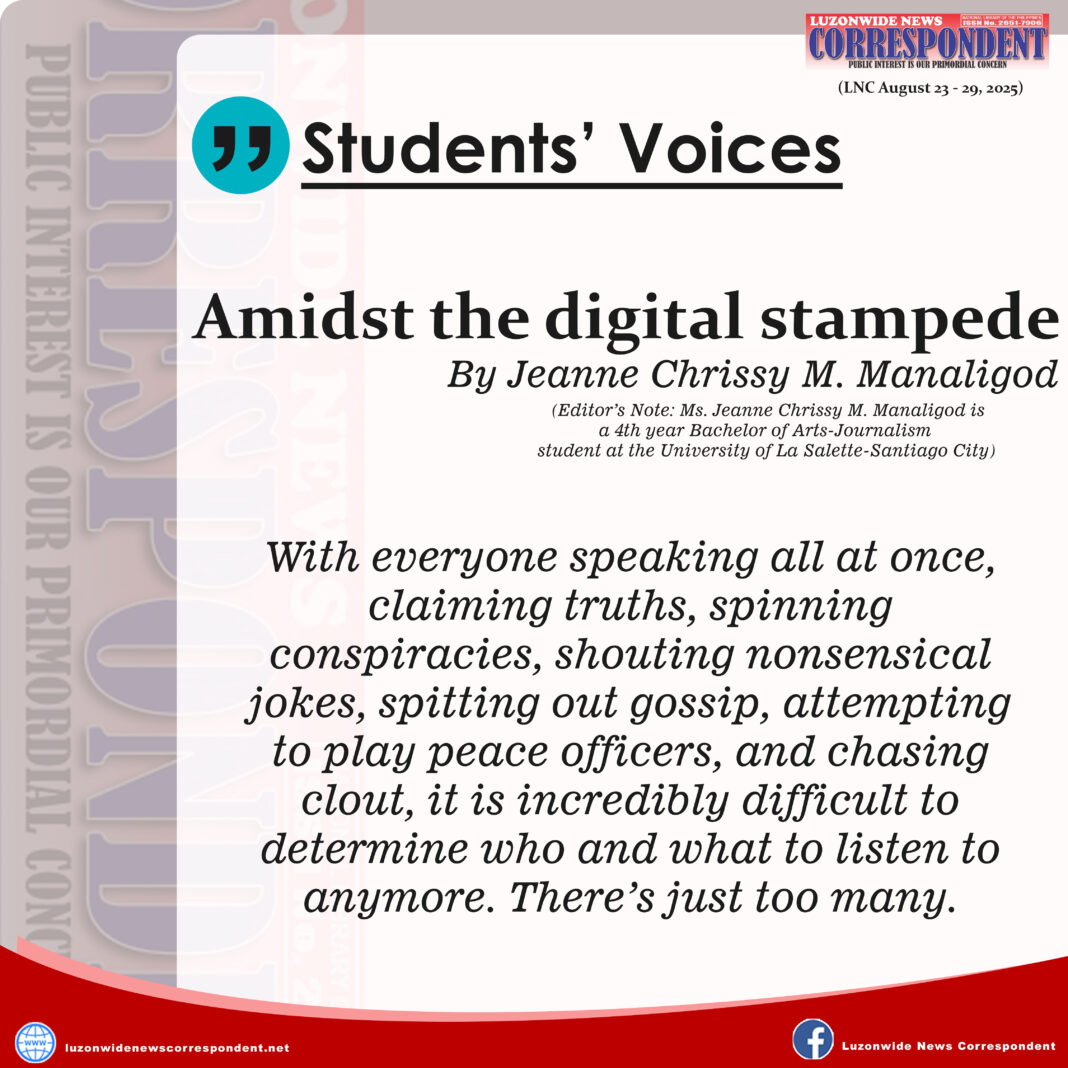By Jeanne Chrissy M. Manaligod
(Editor’s Note: Ms. Jeanne Chrissy is a 4th Year Bachelor of Arts-Journalism student at the University of La Salette, Santiago City.)
Published in its print edition on August 23 – 29, 2025
With everyone speaking all at once, claiming truths, spinning conspiracies, shouting nonsensical jokes, spitting out gossip, attempting to play peace officers, and chasing clout, it is incredibly difficult to determine who and what to listen to anymore. There’s just too many. Too much. It has become a jungle of predators and prey and useless but harmless users and everybody wants to speak but nobody wants to listen. Or they only listen to the ones saying the same thing. Because of this, it has become so easy for politicians, huge corporations, and powerful people in general to twist truths in their favor, gaining the people’s sympathy, and successfully antagonizing journalists.
This is why journalism as a profession is relevant now more than ever.
As a journalism student, I am in the gap between two different categories. Journalists and the people. As part of the people, I have experienced first hand the mess that is the social media landscape. I have encountered so much false information disguised as news, with ‘experts’ perpetuating them and self-proclaimed citizen journalists chiming in to weave intricate plots of deceit. During the senatorial elections, for example, so many testimonies from random people appeared on my feed, claiming that Apollo Quiboloy is innocent and those who say otherwise must be r-ped, that Bong Go ‘initiated’ certain projects that ‘greatly’ helped the people, that Duterte, their beloved Tatay must be freed so they would vote for the latter’s allies, and so. many. more. The worst thing about this is, people actually believe them. Even my Lolas, my Titos, and my Titas, and some of my cousins. They claim that journalists are just anti-government freaks and so we must listen to those who say the opposite of what these journalists are saying.
As a journalist myself, although not yet professional, I know the weight of the job. I know how careful and comprehensive research must be in order to produce a single article. There are news values that must be followed and ethical guidelines that must be applied. We fact-check and cross-check sources,
analyze trends, and use statistical data to support our claims. Unlike so many people randomly popping up like mushrooms to ‘tell truths’, we take accountability with what we publish. We tell the stories of those who are forced to stay silent. We become the voices of those without. There is a duty that needs to be upheld.
This being said, I also know how difficult it is to adapt to the new technologies and multimedia platforms that steal the attention of the people. It is a digital stampede. An overload of information. Journalists, funnily enough, have to compete with entertainment. Social media has become a platform to entertain people; because if the content is boring or ‘too serious’ or ‘too intellectual’, nobody would even glance at it unless it has an entertainment factor. It’s a painful reality. People would only engage if truth is glazed with controversy. With drama. Often, with comedic elements or rage baits. If people are not
stimulated enough, the problem presented is discarded and deemed irrelevant. That is the danger of these new platforms. People only care about the trending issues, and not necessarily the ones that need attention the most. And so those whose stories are not entertaining enough for the masses, remain unheard and their situations don’t change at all.
That is when traditional media becomes crucial. Although less and less people consume print materials and AM frequencies, these are still necessary for providing information without the distractions. Other than the fact that it is the main source of those who don’t have access to the internet, particularly those who live in far-flung areas, most traditional media outlets possess what online platforms struggle to obtain—credibility. I said ‘most’ because some denominations have radio stations and publications that
broadcast and print conspiracy theories and blatant lies. But even with the credibility or the small number of people consulting it, traditional media is in danger of extinction. Because print is expensive. Digital is more efficient. So many companies have relocated online; using websites and social networking sites to post articles and pictures traditionally published in print, or video-recording radio broadcasters so that people online can see them.
Journalism and the whole media landscape is a confusing, chaotic mess. I honestly have no idea how to actually do my job as a future professional journalist that would truly create a positive and lasting impact. Nevertheless, it is a duty. And there is always a way to create a wavelet and let it ripple.#







